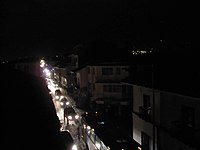
Photo from wikipedia
Abstract Years of civil war in Lebanon (1975–1990) resulted in considerable destruction in its towns and cities, with significant impacts on buildings and infrastructure. Notably, the electricity sector continues to… Click to show full abstract
Abstract Years of civil war in Lebanon (1975–1990) resulted in considerable destruction in its towns and cities, with significant impacts on buildings and infrastructure. Notably, the electricity sector continues to suffer from power outages long after the war ended, and the country’s citizens have adopted various strategies for maintaining desired electricity services in their homes. This has given rise to informal infrastructures, such as diesel-powered generators run by commercial actors or co-owned by urban residents. This paper uses a qualitative approach to explore the multi-faceted experience of power outages in urban areas of Lebanon, the nature and practices of the resulting informal electricity services that have filled that gap, and their impact on everyday life. It argues that the different practical solutions that households have adopted in order to augment electricity provision to their homes create a differentiated experience of infrastructural services in the city, its neighbourhoods and buildings. It explores these impacts through three junctions: the network of informal electricity providers, new routines and practices of households and the objects and artefacts that constitute the energy landscape in the city. This research contributes to an understanding of relationships produced by these ‘new’ and informal infrastructures.
Journal Title: Energy research and social science
Year Published: 2017
Link to full text (if available)
Share on Social Media: Sign Up to like & get
recommendations!